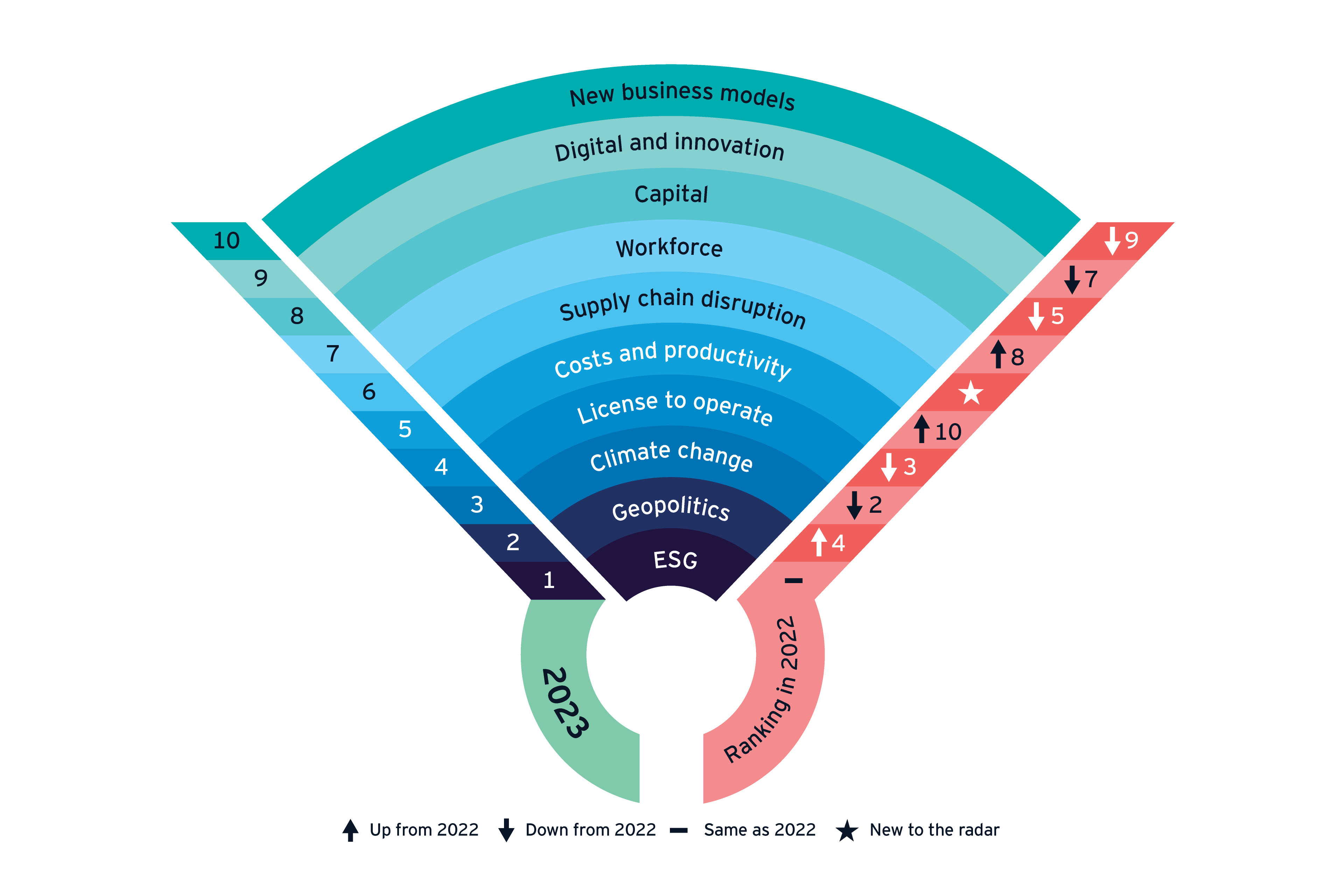Paul Mitchell, EY Global Mining & Metals Leader, says:
“Managing ESG risk is becoming more complex. Miners who get it right can get an edge on competitors in many ways – from accessing capital, to securing license to operate, attracting talent and mitigating climate risk.”
The study also highlights rising concerns around workplace culture. Bullying and harassment are endemic and tied to ongoing issues around a lack of diversity, inclusiveness and respect.
Mitchell says: “The sector needs to do more to improve health, safety and wellbeing. A balanced approach to managing both critical risks and foundational workplace safety and well-being can help companies build a holistic, robust approach.”
Global conflict and geopolitical uncertainty hits the sector
According to the study, global conflict and ongoing disruption are creating new urgency for miners to rethink traditional operating and business models. Geopolitics has risen to number two on the ranking and global volatility is likely to be ongoing, driven by changing governments in key markets, competition between key economies, and a growing tide of resource nationalism.
Mitchell says: “We see evidence that governments are trying to fill revenue gaps created through the COVID-19 pandemic with new or increased mining royalties. For example, Chile plans to introduce copper royalties, and in Australia, the Queensland state government has already increased royalties on coal. For mining and metals companies, the ability to quickly assess the impact of these changes, as well as different alliances, trade flows and governments on business decisions will be critical.”
Urgency for better mitigation of climate change risk
The study highlights that mining and metals companies have become progressively better at managing climate risks, but there are still opportunities to improve. Not enough miners are taking action to minimize the physical risks of climate change, which may threaten operations.
Mitchell says: “Many mining and metals companies have committed to highly ambitious decarbonization targets and a sharper focus on reporting emissions, but 2023 will reveal whether the sector is on the trajectory to net zero.”
Strengthening Indigenous trust critical to license to operate expectations (LTO)
Falling from number one on the ranking, LTO came in at number four despite its increasing complexity. Miners face new LTO expectations, including building livable communities and forging trusted relationships with Indigenous communities.
Mitchell says: “It is critical for mining companies to go beyond doing what’s merely required by law. It’s time to commit to furthering truth and reconciliation. Ultimately, reframing LTO as a way of creating long-term value can have a positive impact on the company’s brand.”
Digital innovation and new business models create opportunities for differentiation
Mining and metals executives surveyed say that data mining and automation, as well as the introduction of an ESG platform to track metrics and reporting, will be the focus of digital investment over the next one to two years.
Digital and data will play an important role in helping miners meet ESG requirements, however, the study highlights that many companies are failing to make the most of the opportunity.
Mitchell says: “We still see some miners taking a siloed approach to implementing technology. An integrated, business-led approach to digital transformation can identify more opportunities to solve some of miners’ biggest challenges, including ESG, climate risk, productivity and costs.”
New business models can also offer opportunities for miners to reposition for a changing future, with many companies considering the benefits of strategies to rationalize, grow and transform.
Mitchell says: “Companies that scrutinize and shift business models now, can get an edge on competitors, as demand and expectations change.”
For the full report, visit here.
Notes to Editors
About EY
EY exists to build a better working world, helping to create long-term value for clients, people and society and build trust in the capital markets.
Enabled by data and technology, diverse EY teams in over 150 countries provide trust through assurance and help clients grow, transform and operate.
Working across assurance, consulting, law, strategy, tax and transactions, EY teams ask better questions to find new answers for the complex issues facing our world today.
EY refers to the global organization, and may refer to one or more, of the member firms of Ernst & Young Global Limited, each of which is a separate legal entity. Ernst & Young Global Limited, a UK company limited by guarantee, does not provide services to clients. Information about how EY collects and uses personal data and a description of the rights individuals have under data protection legislation are available via ey.com/privacy. EY member firms do not practice law where prohibited by local laws. For more information about our organization, please visit ey.com.
This news release has been issued by EYGM Limited, a member of the global EY organization that also does not provide any services to clients.


